#Anita Forrer
Explore tagged Tumblr posts
Text

Annemarie Schwarzenbach (photo by Anita Forrer, 1938)
Annemarie Minna Renée Schwarzenbach (23 May 1908 – 15 November 1942) was a Swiss writer, journalist and photographer. Her bisexual mother brought her up in a masculine style, and her androgynous image suited the bohemian Berlin society of the time, in which she indulged enthusiastically. Via Wikipedia
11 notes
·
View notes
Quote
…I have known with certainty that the worst things, and even despair, are only a kind of abundance and an onslaught of existence that one decision of the heart could turn into its opposite. Where things become truly difficult and unbearable, we find ourselves in a place already very close to its transformation.
Rainer Maria Rilke, from a letter to Anita Forrer, February 14, 1920
642 notes
·
View notes
Text
Rainer Maria Rilke, Lettres à une jeune poétesse, Bouquins Littérature mars 2021.
Rainer Maria Rilke, Lettres à une jeune poétesse, Bouquins Littérature mars 2021.
Chronique de Paule Duquesnoy Rainer Maria Rilke, Lettres à une jeune poétesse, Bouquins Littérature mars 2021. Au moment où commence cette correspondance, Anita Forrer a 18 ans, Rainer Maria Rilke est un poète d’âge mûr, dans sa plénitude. Soixante lettres sur une période de six ans. Elle ne sera pas poète, pas plus que Franz Xaver Kappus, le destinataire des Lettres à un jeune poète, Rilke…

View On WordPress
0 notes
Quote
One must let life run its course. The human being destroys so many things on his own, and it is not in his power to restore anything. Nature, by contrast, has all the power to heal as long as one does not eavesdrop or interrupt it.
Rainer Maria Rilke, from a letter to Anita Forrer, February 14, 1920
278 notes
·
View notes
Note
hi, I'm sorry if this sounds super vague, but do you have anything that could give me some comfort? my mother is in the hospital and I'm unsure of how to navigate my feelings and I feel like some comforting texts might be a great start? if it's too much, you don't have to :) thanks for reading anyway have a great day/night! 💘🥰
hi, i’m so so sorry that you and your mom are going through such a difficult time and i hope things look up. sending you all the love in the world. <3 here and here are some posts with some words on hope, and a few more words that comfort me:
“We talk so much of light, please let me speak on behalf of the good dark. Let us talk more of how dark the beginning of a day is.”
Maggie Smith, from “How Dark the Beginning”
“What we love, shapely and pure, / is not to be held, / but to be believed in.”
Mary Oliver, from Evidence; “Swans”
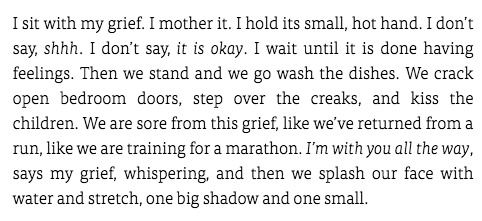
Callista Buchen, “Taking Care”

Cheryl Strayed, Tiny Beautiful Things
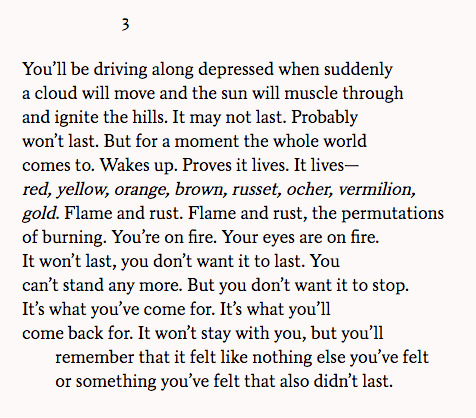
Lloyd Schwartz, “Leaves”

Kahlil Gibran, “On Joy and Sorrow”
“…I have known with certainty that the worst things, and even despair, are only a kind of abundance and an onslaught of existence that one decision of the heart could turn into its opposite. Where things become truly difficult and unbearable, we find ourselves in a place already very close to its transformation.”
Rainer Maria Rilke, from a letter to Anita Forrer, February 14, 1920 as featured in The Dark Interval: Letters on Loss, Grief, and Transformation
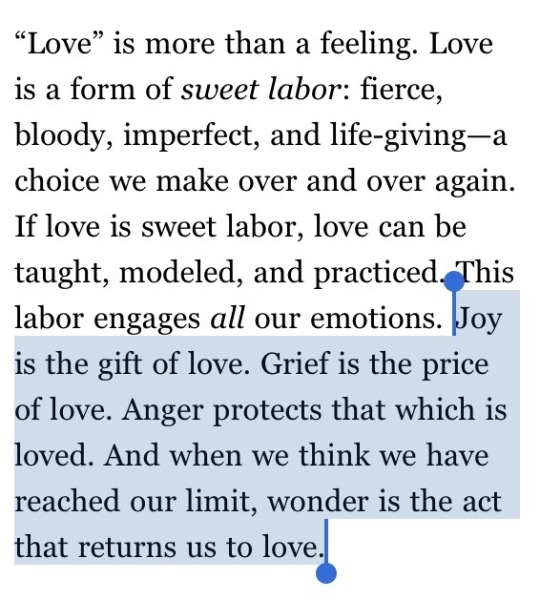
Valarie Kaur, Sikh activist, civil rights attorney, and author
“To touch someone is to risk pain, to risk rejection, be it your own or that of another. […] It is a bridge you walk together, swaying above an abyss of fear. To hold each other’s hands is to have balance. Yet it also means having their weight with you, should there be a sudden fall.”
D. E. Chaudron, excerpt of Your Body, An Altar

Learning to Die: An Interview with Jenny Offill
“...whatever the name of the catastrophe, it is never / the opposite of love.”
Mary Oliver, from Dream Work: Poems; “Shadows”
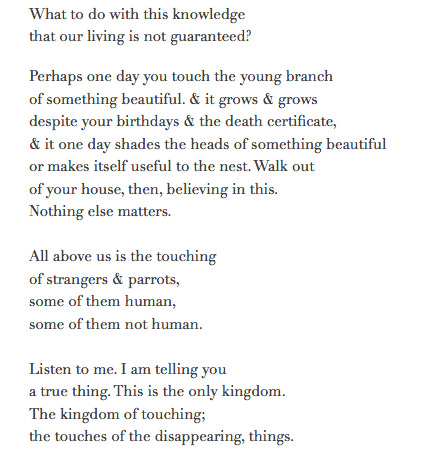
Aracelis Girmay, “Elegy”
“When we will ourselves to stillness, we find we are flawed and cleaved inherently. A rip is a wound that might undo you, but also a space where light comes through.”
Molly McCully Brown; Places I’ve Taken My Body; ‘Poetry, Patience, and Prayer’

Ellen Bass, “The Thing Is”, Poetry of Presence: An Anthology of Mindfulness Poems

(x)
“If grief can be a doorway to love, then let us all weep for the world we are breaking apart so we can love it back to wholeness again.”
Robin Wall Kimmerer, Braiding Sweetgrass
#ask#anon#compilation#you can also look through the tags ->#to be human#a kind of holiness#on grief#i'm so sorry if these aren't what you were looking for#i got very little sleep last night and i should probably have waited to post this#but i wanted to share this sooner rather than later#sending you love <333
524 notes
·
View notes
Note
Hi dear, do you have any good words on emotional courage?
hi my love, you can check out this post and this post; here are a few more:
“I know a lot about pain… and I know it is bad for people, eats away the spirit, but how about courage, what is it for if not to use when needed?”
Martha Gellhorn, Selected Letters
“This is in the end the only kind of courage that is required of us: the courage to face the strangest, most unusual, most inexplicable experiences that can meet us.”
Rainer Maria Rilke, Letters to a Young Poet
“You don’t realize it, perhaps, but you are turning these delusions and illusions of the past into criminal things. Relinquish everything. Stay in bed until you feel so shock full of energy, hope, courage that you bounce out of abed. You can only aid the world–if you still believe the world needs our individual aid–by retaining your faith in life. Your body may be weak, but I know you still have wings.”
Henry Miller, A Literate Passion: Letters of Anaïs Nin and Henry Miller
“I… want to inherit the witch in my women ancestors—the willfulness, the passion, ay, the passion where all good art comes from as women, the perseverance, the survivor skills, the courage, the strength of las mujeres bravas, peleoneras, necias, berrrinchudas. I want to be una brava, una peleonera, necia, nerrinchuda. I want to be bad if bad means I must go against society—el Papá, el Pápa, the boyfriend, lover, husband, girlfriend, comadres—and listen to my own heart, that incredible witch’s broom that will take me where I need to go.”
Sandra Cisneros, A House of My Own
“I wanted you to see what real courage is, instead of getting the idea that courage is a man with a gun in his hand. It’s when you know you’re licked before you begin, but you begin anyway and see it through no matter what.”
Harper Lee, To Kill a Mockingbird
“Many people seem to think it foolish, even superstitious, to believe that the world could still change for the better. And it is true that in winter it is sometimes so bitingly cold that one is tempted to say, ‘What do I care if there is a summer; its warmth is no help to me now.’ Yes, evil often seems to surpass good. But then, in spite of us, and without our permission, there comes at last an end to the bitter frosts. One morning the wind turns, and there is a thaw. And so I must still have hope.”
Vincent van Gogh, The Letters of Vincent van Gogh
“In the winter I am writing about, there was much darkness. Darkness of nature, darkness of event, darkness of the spirit. The sprawling darkness of not knowing. We speak of the light of reason. I would speak here of the darkness of the world, and the light of———. But I don’t know what to call it. Maybe hope. Maybe faith, but not a shaped faith—only, say, a gesture, or a continuum of gestures. But probably it is closer to hope, that is more active, and far messier than faith must be. Faith, as I imagine it, is tensile, and cool, and has no need of words. Hope, I know is a fighter and a screamer.”
Mary Oliver, Winter Hours: Prose, Poems, and Prose Poems
“There is always some miracle left; and though miracles do not happen, they might happen. Who knows? Perhaps our intelligence, our instinct, our senses, in spite of their daylight clearness, are leading us astray. Perhaps the one thing needful is just that unreasoning courage which follows hope’s will-o’-the-wisp as it burns…”
Jens Peter Jacobsen, Niels Lyhne
“But if the deepest loss, […] / can be, not just survived, but made into the matter / of hope, made into song, not into a hatchet / to cut off the offending parts, made into poems / then blessed be the end of things, the loss of whatever / secures us blindly and mutely to our lives.”
Julia Alvarez, The Other Side/El Otro Lado
“I run / stumbling, expectant. / Impatience is hopelessly / desperate. Hope / takes time.”
Marie Ponsot, Springing: New and Selected Poems
“How lightly we learn to hold hope, / as if it were an animal that could turn around / and bite your hand. And still we carry it / the way a mother would, carefully, / from one day to the next.”
Danusha Laméris, The Moons of August
“Do not get lost in a sea of despair. Be hopeful, be optimistic. Our struggle is not the struggle of a day, a week, a month, or a year, it is the struggle of a lifetime. Never, ever be afraid to make some noise and get in good trouble, necessary trouble.”
Representative John Lewis
“Where does such a force come from? What does it mean? A voice very faint, and inside me, offers a possibility: how shall there be redemption and resurrection unless there has been a great sorrow? And isn’t struggle and rising the real work of our lives?”
Mary Oliver, Winter Hours: Prose, Poems, and Prose Poems
“Don’t forget that apparent impossibility of something is the first sign of its naturalness—in a different world, obviously.
Marina Tsvetaeva, from a letter to Anatoly Steiger
“Grieve. Have / hope.”
Jorie Graham, Swarm

John Berryman, “The Heart is Strange”
“Skin had hope, that what’s skin does. / Heals over the scarred place, makes a road.”
Naomi Shihab Nye, “Two Countries”
“I am quite troubled in the depths of my soul. But that will pass,”
George Sand, in a letter to Gustave Flaubert
“Let’s dance a little before we go home to hell.”
Muriel Rukeyser, A Muriel Rukeyser Reader

Hélène Cixous, Hyperdream (tr. Beverly Bie Brahic)
“That most moments were substantially the same did not detract at all from the possibility that the next moment might be utterly different.”
Marilynne Robinson, Housekeeping

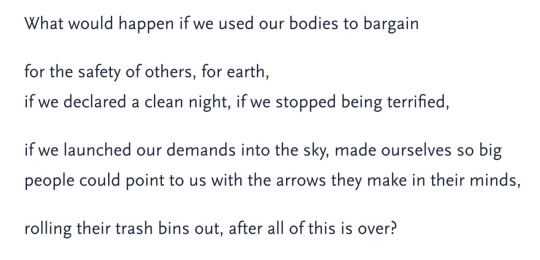
Ada Limón, “Dead Stars”
“Listen, everyone has a chance. Is it spring, is it morning? Are there trees near you, and does your own soul need comforting? Quick, then — open the door and fly on your heavy feet…”
Mary Oliver, New and Selected Poems
“Get to the bottom of this intensity and have faith in what is most horrible, instead of fighting it off—it reveals itself for those who can trust it, in spite of its overwhelming and dire appearance, as a kind of initiation. By way of loss, by way of such vast and immeasurable experiences of loss, we are quite powerfully introduced to the whole.”
Rainer Maria Rilke, from a letter to Countess Alexandrine Schwerin, June 16, 1922
“…only one thing is urgently needed: to attach oneself with unconditional purpose somewhere to nature, to what is strong, striving and bright, and to move forward without guile, even if that means in the least important, daily matters. Each time we tackle something with joy, each time we open our eyes toward a yet untouched distance we transform not only this and the next moment, but we also rearrange and gradually assimilate the past inside of us.”
Rainer Maria Rilke, from a letter to Adelheid von der Marwitz, September 11, 1919
“Continue to believe that with your feeling and with your work you take part in what is the greatest. The more strongly you cultivate this belief inside of you, the more it will give rise to reality and world.”
Rainer Maria Rilke, from a letter to Elisabeth Freiin Schenk zu Schweinsberg, September 23, 1908
“…I have known with certainty that the worst things, and even despair, are only a kind of abundance and an onslaught of existence that one decision of the heart could turn into its opposite. Where things become truly difficult and unbearable, we find ourselves in a place already very close to its transformation.”
Rainer Maria Rilke, from a letter to Anita Forrer, February 14, 1920
“…he says, it will be all right.
“It is not the saying of an oracle or a prophet. They are words you might speak to a child ... and somehow I am comforted. He does not mean that it does not hurt. He does not mean that we are not frightened. Only that: we are here. This is what it means to swim in the tide, to walk the earth and feel it touch your feet. This is what it means to be alive.”
Madeline Miller, Circe
“Right then she knows herself even less than she knows the sea. Her courage comes from not knowing herself, but going ahead nevertheless. Not knowing yourself is inevitable, and not knowing yourself demands courage.
Clarice Lispector, Complete Stories; “The Waters of the World”

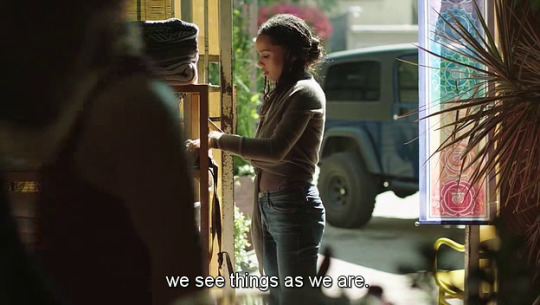
“Recovery (which includes return and renewal of health) is a re-gaining—regaining of a clear view. I do not say “seeing things as they are” and involve myself with the philosophers, though I might venture to say “seeing things as we are (or were) meant to see them”—as things apart from ourselves. We need, in any case, to clean our windows; so that the things seen clearly may be freed from the drab blur of triteness or familiarity—from possessiveness. Of all faces those of our familiares are the ones both most difficult to play fantastic tricks with, and most difficult really to see with fresh attention, perceiving their likeness and unlikeness: that they are faces, and yet unique faces.”
J.R.R. Tolkien, from his essay On Fairy-Stories

Camille Norton, Corruption: Poems
“Keep busy with survival. Imitate the trees. Learn to lose in order to recover, and remember that nothing stays the same for long, not even pain, psychic pain. Sit it out. Let it all pass. Let it go.”
May Sarton, Journal of a Solitude
“I have the fervour of myself for a presence / and my own spirit for light; / and my spirit with its loss / knows this; though small against the black, / small against the formless rocks, / hell must break before I am lost;”
H.D. from Collected Poems; “Eurydice”
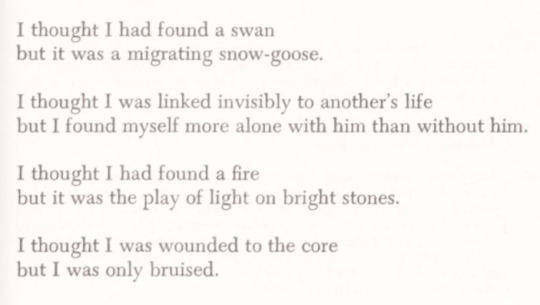
Denise Levertov, “Epilogue”
“The days go numb, the wind / sucks the world from your senses like withered leaves. // Through the empty branches the sky remains. / It is what you have. / Be earth now, and evensong. / Be the ground lying under that sky. / Be modest now, like a thing / ripened until it is real…”
Rainer Maria Rilke, from Rilke’s Book of Hours (tr. Anita Barrows, Joanna Macy)
“I know your sorrow and I know that for the likes of us there is not ease for the heart to be had from words of reason and that in the very assurance of sorrow’s fading there is more sorrow. So I offer you only my deeply affectionate and compassionate thoughts and wish for you only that the strange thing may never fail you, whatever it is, that gives us the strength to live on and on with our wounds.”
Samuel Beckett’s words of consolation to his friend, Alan Schneider
“What matters is not to allow my whole life to be dominated by what is going on inside me. That has to be kept subordinate one way or another. What I mean is: one must not let oneself be completely disabled by just one thing, however bad; don’t let it impede the great stream of life that flows through you. I have the feeling of something secret deep inside me that no one knows about.”
Etty Hillesum, from a diary entry featured in An Interrupted Life
“You have been told that, even like a chain, you are as weak as your weakest link. / This is but half the truth. You are also as strong as your strongest link. / To measure you by your smallest deed is to reckon the power of the ocean by the frailty of its foam. / To judge you by your failures is to cast blame upon the seasons for their inconstancy.”
Kahlil Gibran, The Prophet
“Try to keep what is beautiful to you and what you can use for today and now — You must not let things you cannot help destroy you —”
Georgia O’Keeffe, from Georgia O’Keeffe: Art and Letters
“What we love, shapely and pure, / is not to be held, / but to be believed in.”
Mary Oliver, from Evidence; “Swans”
“In time of the crises of the spirit, we are aware of all our need, our need for each other and our need for ourselves. We call up, with all the strength of summoning we have, our fullness. And then we turn; for it is a turning that we have prepared; and act. The time of turning may be very long. It may hardly exist.”
Muriel Rukeyser, from A Muriel Rukeyser Reader, “The Life of Poetry”
“To be hopeful in bad times is not just foolishly romantic. It is based on the fact that human history is a history not only of cruelty, but also of compassion, sacrifice, courage, kindness. What we choose to emphasize in this complex history will determine our lives. If we see only the worst, it destroys our capacity to do something. If we remember those times and places—and there are so many—where people have behaved magnificently, this gives us the energy to act, and at least the possibility of sending this spinning top of a world in a different direction. And if we do act, in however small a way, we don’t have to wait for some grand utopian future. The future is an infinite succession of presents, and to live now as we think human beings should live, in defiance of all that is bad around us, is itself a marvelous victory.”
Howard Zinn, A Power Governments Cannot Suppress
“But don’t lose heart, dear ones—don’t lose heart. Don’t let it make you bitter. Try to understand. Try to understand. The world’s already bitter enough, we got to try to be better than the world.”
James Baldwin, from Another Country
“You do not have to be good. / You do not have to walk on your knees / for a hundred miles through the desert, repenting. / You only have to let the soft animal of your body / love what it loves. / Tell me about despair, yours, and I will tell you mine. / Meanwhile, the world goes on.”
Mary Oliver, “Wild Geese”
#ask#anon#quote compilation#emotional courage#words#lit#poetry#long post#of hope to bite on like a bullet#yeah ok i have no chill#also no explanation for how my brain works and ties all of these together#compilation
575 notes
·
View notes
Note
How does one let go? Of another, of one's self, of the life you thought you were living. Do you know any fitting poems or quotes describing the phenomenon of moving forward?
I’m not sure that I’ve ever let go of anything in my entire life. This Anne Carson quote always seems to sum up my thoughts in four succinct lines:

I find the phenomenon of letting go so inextricably tied with the idea of healing or recovery, perhaps because that’s what the desire to “let go” and move forward looks like for me. How do you let go of something that happened to you or within you, something that has altered your conception of the world from one day to the next, that has altered your own perception of yourself, of who you thought you were or could be, of what you thought your life would be? How to come to terms with the reality that there is no return to who you were before?
For me it’s less a deliberate choice to brush my hands together and “let go”, but more simply putting one foot in front of the other every day until I find myself in a (perhaps even just slightly) different place than before. It’s allowing myself to grieve what I thought my life would be, and also allowing space to hold gratitude for what my life contains. It’s waiting for everything inside of me and around me to shatter, and meanwhile still moving forward. It’s allowing myself to realize that I’m still here and I’m still a whole person, even if the pieces of me have shattered and rearranged themselves into something I don’t necessarily always recognize. It’s sitting alone with myself, with the silence that sometimes makes a home of my throat, with the restlessness beneath my skin, with the fear that who I am becoming won’t be enough, and moving anyway in any direction but back. It’s sitting with grief and shame and bitterness and groundlessness, and understanding that these feelings are temporary, and not things be used to validate my fears or distortions.
I think the deliberate choice involved for me is the one to allow space for growth, to not cling so tightly to past hopes or ideas that there is no longer any room for anything else, anything new, anything different. It’s allowing myself the belief and compassionate understanding that I can be something other than I thought or hoped I would be, and it’s ok. I think sometimes we deny ourselves chances to grow or change because of the shame we feel that we have failed, and to deny ourselves those opportunities for growth would be the real shame. What others believe does not matter—that we have invested ourselves utterly in a relationship that failed is no shame on us, that we have invested ourselves utterly in a dream or a hope that just didn’t work out is no shame on us. I think the worst thing is to remain in a place that is no longer serving us for fear of appearing the failure to others. There is so much opportunity to be had in letting go of one thing, anything, to make room for something else.
I don’t know that this compilation of poetry, essays, literature, and letters will offer any insight, or comfort, or guidance. Letting go must surely be an intensely personal process, an intensely personal thing, a different kind of animal for everyone—but still there seem to be some universal experiences. So these are some of the words that came to mind for me—whether they touch on grappling with the impossibility of letting go and moving forward, the hope of it, the desire for it, the loneliness of it, or the frustration with it (bc of course it’s something that cannot be forced, only something that can be allowed):
“What could I have grown up to be? What kind of human woman, what kind of simple, happy thing? If I had never been broken on a bird’s wing. If I had never seen the world naked. I want to be myself again…I want to stop knowing everything I know.”
Catherynne M. Valente, Deathless
“On the surface, I was poised, cool, indifferent. […] The discrepancy between what I would show the world and the chaos I felt grew steadily more intense.”
Louise Glück, Proofs & Theories: Essays on Poetry
“There were glimpses, moments, breathing spaces of calm, but all the rest of the time it was like living in a house that couldn’t be cured of the habit of catching on fire, on a ship that got wrecked every day.”
Katherine Mansfield, “At the Bay”
“Words can’t describe the wound. / Perhaps more importantly / words alone / can’t heal the wound.”
Emily Pettit, “Hands Like Lighters”
“But sometimes words are the only hands / we have to touch a bruised memory / or cleanse a wound that never healed / or lift a body we carried for years / at last to the pyre of shared grief.”
Fred Dings, Eulogy for a Private Man
“I sat on a gray stone bench / and placed my grief / in the mouth of language, / the only thing that would grieve with me.”
Lisel Mueller, Alive Together: Poems
“I am not myself, and cannot ever be / again. I am my own emptiness, trying to fill my emptiness / with words.”
Robert Kroetsch, “Letters to Salonika”
“Now that I’m free to be myself, who am I? / Can’t fly, can’t run, and see how slowly I walk.”
Mary Oliver, from Blue Iris
“Can I never escape this interminable mourning for myself?”
Susan Sontag, from Reborn
“The light of the moon poured down; its beauty, / its radiance. / And I grieved and grieved. I grieved for so long.”
from Phoebus was gone, all gone, his journey over (tr. Eavan Boland)
“When will, when will, when will it be enough, / the saying and lamenting?”
Rainer Maria Rilke, Uncollected Poems
“…she was only trying to smooth out something she had been given years ago folded up;”
Virginia Woolf, To the Lighthouse
“It seemed increasingly impossible to remember a time when I had been fully alive, impossible to imagine a future in which I would live that way again.”
Louise Glück, Proofs & Theories: Essays on Poetry
“Everything is so fragile. I feel so lost. I live off secret, radiating, luminous rays that would smother me if I didn’t cover them with a heavy cloak of false certainties. God help me: I have no one to guide me and it’s dark again.”
Clarice Lispector, The Stream of Life
“Make a place for yourself in the darkness and wait there. Be there.”
Denise Levertov, To Stay Alive
“Losing is also ours; and even forgetting has its shape in the permanent realm of change. Things we’ve let go of circle; and though we’re rarely at the center of these circles: they trace around us the unbroken figure.”
Rainer Maria Rilke, “For Hans Corossa” (tr. Edward Snow)
“Someone I loved once gave me a box full of darkness. / It took me years to understand that this, too, was a gift.”
Mary Oliver, “The Uses of Sorrow”
“Things take us hard, no question. / How do you make it, all the way from here to morning?”
Adrienne Rich, Diving into the Wreck
“Following a fearful night I do not quite / remember came a kind / of dawn, not light, / But something we could see by.”
Edna St. Vincent Millay, “Dream of Saba”
“Afterward, you go back to the old place—all that remains is char: blackness and emptiness. You think: how could I live here? But it was different then, even last summer. The earth behaved as though nothing could go wrong with it. One match was all it took. But at the right time—it had to be the right time. The field parched, dry—the deadness in place already so to speak.”
Louise Glück, Averno
“…the longing, not for something distant or remote, but for what is lost forever, something that can never return.”
Henia Karmel, A Wall of Two
“When a thing’s gone, it’s gone. It’s over and done with. Let it go then! Ignore it, and comfort yourself, if you do want comforting, with the thought that you never do recover the same thing that you lose. It’s always a new thing. The moment it leaves you, it’s changed.”
Katherine Mansfield, “Je ne parle pas français”
“I cannot go back now. […] For me to go back is impossible, now or later.”
Marina Tsvetaeva, from a letter to Boris Pasternak
“There comes a day when the trees / refuse to let you pass / until you name them.”
Lisel Mueller, Second Language: Poems
“Anyway, it’s in grappling with things at the source that you can tell best whether a thing is worth continuing or not… In other words, everything is worth investigating, wasting time over, if it interests you. There is always a deep, unconcealed reason why it interests you.”
Henry Miller, from a letter to Anaïs Nin
“We only live by somehow absorbing the past—changing it. I mean really examining it and dividing what is important from what is not (for there is waste) and transforming it so that it becomes a part of the life of the spirit and we are free of it. It’s no longer our personal past, it’s just in the highest possible sense, our servant. I mean that it is no longer our master.”
Katherine Mansfield, from a letter to J.M. Murry
“…only one thing is urgently needed: to attach oneself with unconditional purpose somewhere to nature, to what is strong, striving and bright, and to move forward without guile, even if ithat means in the least important, daily matters. Each time we tackle something with joy, each time we open our eyes toward a yet untouched distance we transform not only this and the next moment, but we also rearrange and gradually assimilate the past inside of us.”
Rainer Maria Rilke, from a letter to Adelheid von der Marwitz
“Keep busy with survival. Imitate the trees. Learn to lose in order to recover, and remember that nothing stays the same for long, not even pain, psychic pain. Sit it out. Let it all pass. Let it go.”
May Sarton, Journal of a Solitude
“One must let life run its course. The human being destroys so many things on his own, and it is not in his power to restore anything. Nature, by contrast, has all the power to heal as long as one does not eavesdrop or interrupt it.”
Rainer Maria Rilke, from a letter to Anita Forrer
“Do not try to be saved, but let redemption find you, as it certainly will. Love is its own rescue; for we, at our supremest, are but its trembling emblems.”
Emily Dickinson, from a letter to T.W. Higginson
“To take things easy, not to fight against the ebb and flow of life, but to give way to it—that was what was needed. It was the tension that was all wrong.”
Katherine Mansfield, “At the Bay”
“If you find yourself disappointing—drop self-expectations. What you are turning into you cannot expect to know, but you can trust it, and believe that if it is other than you planned, it will also be better than you planned—however different.”
Kahlil Gibran, from a letter to Mary Haskell
“To live in this world / you must be able / to do three things: / to love what is mortal; / to hold it / against your bones knowing / your own life depends on it; / and when the time comes to let it go, / to let it go.”
Mary Oliver, “At Blackwater Pond”
#this response is abominably late i know#i frankly could not bear to grapple with putting to words the concept of letting go this past year#i was in the midst of it (though tbh i think i always am)#ask#letting go#words#poetry#lit#letters#compilation
665 notes
·
View notes